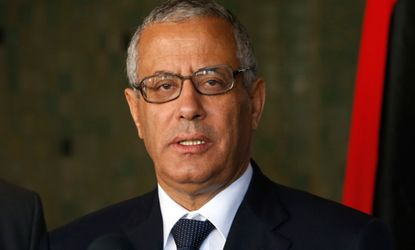Is the U.S. indirectly responsible for the abduction of Libya's prime minister?
Suspected Islamist militants briefly kidnapped Ali Zeidan, purportedly in retaliation for the U.S. seizure of an al Qaeda leader


Early Thursday morning, gunmen swarmed Tripoli's Corinthia Hotel and seized Libyan Prime Minister Ali Zeidan, rushing him and two guards away in vans. At the time, the government confirmed the abduction, saying that Zeidan "was taken to an unknown destination for unknown reasons by a group" of men, probably former rebels. By the afternoon, he had been freed. What happened, and who, ultimately, was to blame for the odd affair?
A coalition of militias called the the Operations Room of Libya's Revolutionaries and Anti-Crime Committee immediately claimed responsibility for the seizure, but characterized it as an arrest. The group, made up of former fighters who helped depose Moammar Gadhafi, technically works for the Interior Ministry. Like other parts of the weak central government, the Ministry hired on former rebel militias to make up for the lack of a viable army or police force, and so it wouldn't have to fight the armed groups itself.
The Operation Room of Libya's Revolutionaries first said on its Facebook page that Zeidan was "arrested under the Libyan penal code... on the instructions of the public prosecutor." The public prosecutor's office, however, said it didn't order Zeidan's arrest.
Subscribe to The Week
Escape your echo chamber. Get the facts behind the news, plus analysis from multiple perspectives.

Sign up for The Week's Free Newsletters
From our morning news briefing to a weekly Good News Newsletter, get the best of The Week delivered directly to your inbox.
From our morning news briefing to a weekly Good News Newsletter, get the best of The Week delivered directly to your inbox.
A spokesman for the Operation Room of Libya's Revolutionaries elaborated, pinning the seizure on the U.S. raid in Tripoli last weekend that nabbed an alleged leader of al Qaeda. He told Al Arabiya that Zeidan's arrest came "after the statement by John Kerry about the capture of Abu Anas al-Libi, after he said the Libyan government was aware of the operation." (Al-Libi is the nom de guerre of Nazih Abdul-Hamed al-Ruqai, indicted in U.S. court for the deadly 1998 bombings of U.S. embassies in Kenya and Tanzania.) It was a mischaracterization of Kerry's carefully worded phrasing, but indicative nonetheless of the blow the raid has caused to the Libyan government.
So, is the U.S. ultimately responsible for Zeidan's abduction, and the spiraling situation in Libya it represents? Maybe. Blame is like an onion, and the first layer obviously belongs to the militia itself.
Hashem Beshr, the head of one of the country's most powerful militia groups — the Supreme Security Committee for Tripoli — and a commander The Washington Post recently called "the most powerful man" in the capital, says the whole thing was basically a misunderstanding. The group took Zaidan based on false information that the public prosecutor had issued an arrest warrant for him, Beshr tells Bloomberg News.
But its also true that there's a lot of anger in Libya over the foreign abduction of one of its citizens, alleged terrorist or not. Before Zeidan's kidnapping, U.S. officials told The New York Times they feared the backlash against a second planned U.S. raid — to nab the suspected mastermind of the September 2012 attacks on the diplomatic mission in Benghazi — would be enough to topple Zeidan's government.
Sign up for Today's Best Articles in your inbox
A free daily email with the biggest news stories of the day – and the best features from TheWeek.com
David Kirkpatrick and Gerry Mullany at The New York Times also note that Libyans are increasingly suspicious of American intentions in Libya:
While most Libyans remain overwhelmingly grateful for the intervention, they still suspect Washington and the West of hegemonic ambitions. Although they may oppose Qaeda or terrorism, Libyans across the political spectrum say they object to American military action on Libyan soil and the extradition of Libyan citizens for trial in American courts.
Those complaints have come to the fore since the American raid that captured Mr. Ruqai, also known as Abu Anas al-Libi. [The New York Times]
Indirectly, at least, the U.S.'s abduction of Al-Libi seems to have led to Zeidan's odd ordeal. However, the questions remains whether it sparked a fire that will burn out of control.
Create an account with the same email registered to your subscription to unlock access.
Peter has worked as a news and culture writer and editor at The Week since the site's launch in 2008. He covers politics, world affairs, religion and cultural currents. His journalism career began as a copy editor at a financial newswire and has included editorial positions at The New York Times Magazine, Facts on File, and Oregon State University.
-
 Magazine interactive crossword - April 26, 2024
Magazine interactive crossword - April 26, 2024Puzzles and Quizzes Issue - April 26, 2024
By The Week US Published
-
 Magazine solutions - April 26, 2024
Magazine solutions - April 26, 2024Puzzles and Quizzes Issue - April 26, 2024
By The Week US Published
-
 Magazine printables - April 26, 2024
Magazine printables - April 26, 2024Puzzles and Quizzes Issue - April 26, 2024
By The Week US Published